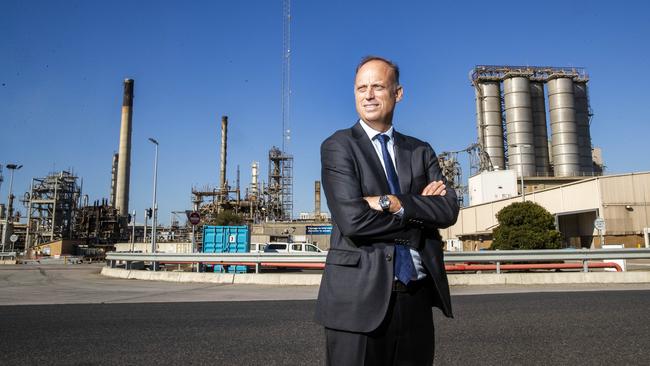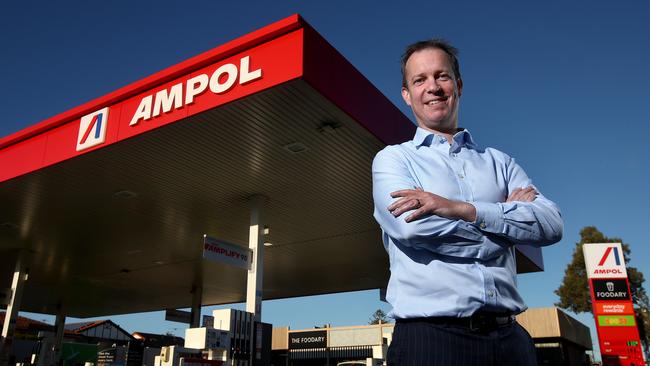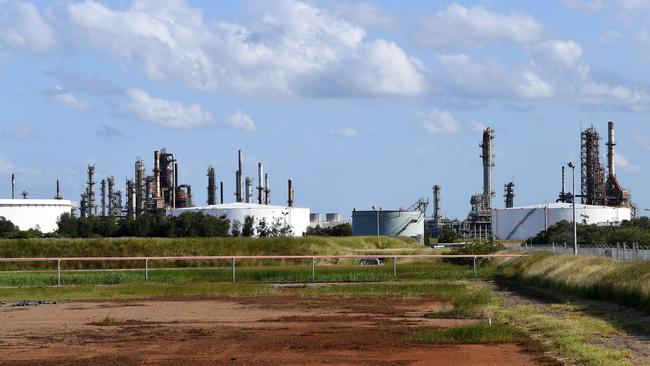Subsidy deal keeps Brisbane, Geelong refineries open
Australia’s two remaining oil refineries will remain open for at least six more years under taxpayer subsidies of up to $2.3bn.

Australia’s two remaining oil refineries will remain open for at least six more years under taxpayer subsidies of up to $2.3bn with the rescue package buoying the fortunes of Ampol and Viva Energy but raising questions whether it safeguards the nation’s fuel security.
Ampol’s Lytton refinery in Brisbane and Viva’s Geelong plant in Victoria were both under threat after being battered by the COVID crisis with torrid conditions already resulting in decisions by ExxonMobil to close Melbourne’s Altona facility and BP to shut Kwinana’s doors in Perth.
The rescue scheme, foreshadowed in The Australian, keeps 1250 workers in jobs and two of the nation’s major manufacturing facilities open with shares in Ampol and Viva surging and analysts immediately asking whether companies would use the earnings certainty to give money back to investors or embark on takeover deals.
Ampol immediately acknowledged it expected a “re-rating” from analysts reflecting the added value that should be reflected in its share price now much of the volatility had evaporated.
“Volatility in our earnings became such a big overhang for our business. To eliminate that downside exposure should open up a seriously improved equity rating for our business, not just for the refining earnings. Clearly it enables a lot more capacity on our balance sheet with that underwrite,” Ampol chief executive Matt Halliday said.
Ampol will receive $108m a year for Lytton during periods of low refining margins and a $135m funding grant to undertake upgrades to produce ultra-low sulphur petrol. Lytton will remain open until mid-2027 with Ampol holding an option to extend the support for a further three years.
“This is such a good deal – what’s the catch?” Bank of America analyst David Errington asked Ampol’s Mr Halliday on an investor call. “You’ve negotiated a great package for your shareholders.”

A similar sentiment was raised with Viva, Ampol’s rival, which also gained earnings certainty from the rescue deal.
“You reduce your volatility of earnings, you get your cash support, you get your capital expenditure provided, it’s just a fantastic package,” Mr Errington told Viva boss Scott Wyatt.
Ampol shares surged 6.1 per cent to $27.51 while Viva rose 7 per cent to $2.13.
The package provides earnings certainty after huge volatility for Lytton over the last few years which has seen the plant run at a loss with Viva saying it struck the right balance.
“Refining volatility has been challenging and particularly last year with not just ours but refineries right around the world with COVID-19,” Mr Wyatt said. “It was a clever framework that protects the energy security requirements of the country but provides the refining sector with the long-term certainty to retain operations and make those investment decisions.”
Still, the degree with which it improves Australia’s fuel security was called into question with the nation still importing 80 per cent of its fuel needs.
“Protecting Australia’s remaining refiners sounds like a security solution until you consider they imported 81 per cent of the crude they refined in 2018-19,” Australian Automobile Association managing director Michael Bradley said.

The deal ensures the future of Viva’s Geelong refinery, which suffered a loss of over $200m in the 2020 financial year. Viva said the fuel package was not designed to underpin or support Geelong’s profits, but to mitigate the downside risk of low refining margin cycles which has roiled Australian refineries in recent years.
“The sector has faced several structural headwinds in recent years from challenged trading conditions globally, increased competition from Asian refinery imports, and the significant impacts of demand destruction from the COVID-19 pandemic in 2020,” Mr Wyatt said.
“This has seen the number of refineries in Australia reduce from six in 2011, to only two continuing refineries today, leaving the country predominantly reliant on product imports from international refineries for our fuel requirements.”
Fears have been growing the nation’s refining sector could disappear entirely in the face of falling demand brought on by the pandemic and competition from far larger refineries in Singapore, South Korea, Japan and elsewhere in Asia.
Consumers may have paid an extra 1c a litre for petrol if all refineries were to close in Australia, government modelling showed.
The variable Fuel Security Service Payment increases when refineries’ margins are low and tapers off when profits are high, hitting $2.04bn by 2030 under a worst-case scenario.
Cutting volatility in refining may also improve the prospects of corporate takeover interest in Ampol after Canada’s Couche-Tard made a $8.6bn takeover bid in 2020.
AWU National Secretary Dan Walton said the announcement will underpin the nation’s fuel security.
“If these refineries had shut it would mean Australia was fully dependent on fragile supply chains running through global hot spots to power our transport, aviation, agriculture, and defence industries,” Mr Walton said.
“We urge the states to work with the federal government to ensure the federal government‘s policies are durable and calibrated to ensure Australia retains its fuel refining capacity.”



To join the conversation, please log in. Don't have an account? Register
Join the conversation, you are commenting as Logout